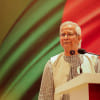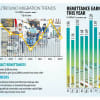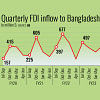Bangladesh must harness the potential of its diaspora

It is disheartening to see Bangladesh trail behind its South Asian counterparts in terms of harnessing the financial potential of its diaspora, despite the growth in remittance inflow which is expected to reach $23 billion by the end of 2023—an increase of 8 percent year-on-year. The disparity has once again come to light after a World Bank report revealed that Bangladesh holds a mere $1.34 billion in deposits from its non-resident citizens. By contrast, crisis-hit Pakistan and Sri Lanka boast significantly higher figures of $3.7 billion and $7.78 billion, respectively. India leads with a staggering $143 billion in such deposits. This shows the urgency of revamping our strategies to further engage our expatriates.
There is no denying the importance of greater private capital flows to countries like Bangladesh. As per the WB report, "as debt indicators have worsened in the LMICs [lower-middle-income countries], and sovereign risks increased, countries may benefit from efforts to attract diaspora investors who may view investment opportunities in their countries of origin through a more favourable lens than do institutional investors from the global north." Bangladesh has initiatives in place to attract foreign direct investment (FDI) and remittance through formal channels; non-resident deposits serve as another vital source of external private finance. Although the amount raised by developing countries via diaspora bonds has so far been minuscule compared to the volume of remittance inflows, it only underscores the largely untapped potential of such avenues of capital mobilisation.
Many countries, notably India, have implemented savings programmes to attract foreign currency deposits from non-resident citizens. These schemes offer scopes for tax-exempt, repatriable, and higher-yielding deposits. Bangladesh, too, has several schemes—the US Dollar Investment Bond (USDIB), the US Dollar Premium Bond (USDPB), and the Wage Earner Development Bond (WEDB)—aimed at attracting diaspora investors. However, these initiatives require further enhancement and promotion. Our expatriates are our assets, and if utilised properly and judiciously, we can hugely benefit not just from their remittances and deposits but also from their expertise in policymaking, education, and other areas of public interest.
At a time when we are struggling with a protracted economic crisis, attracting non-resident deposits and investments, as well as optimising remittance inflows, is paramount. The government, therefore, must review existing savings schemes, enhance their attractiveness, and foster a conducive environment for diaspora contributions. More specifically, it should take steps to enhance financial literacy among non-resident Bangladeshis, ensure competitive rates of return, and transparently communicate the benefits of investing in the nation. Collaborative efforts between financial institutions, policymakers, and the diaspora community are also essential.


 For all latest news, follow The Daily Star's Google News channel.
For all latest news, follow The Daily Star's Google News channel. 










Comments